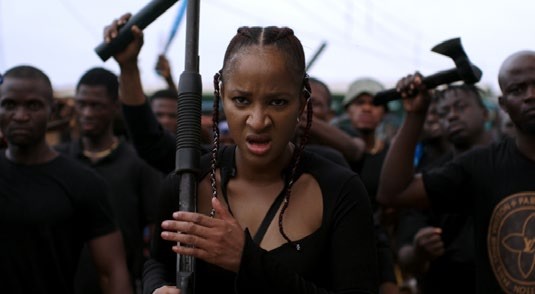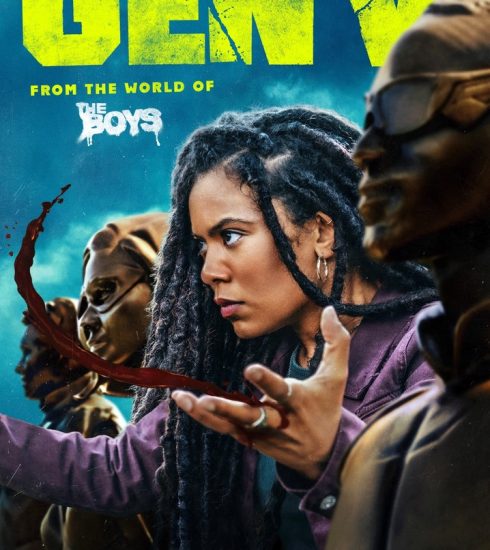Movie Review: Gangs of Lagos
Nollywood has long been one of the busiest local film industries in the world. Year after year thousands of films are churned out, yet few get any international recognition. That might be ready to change, as the home-grown industry has rapidly evolved from the low-budget video productions of the ‘90s to a polished, multi-genre popular cinema today. Even Hollywood is tapping in; recent African-centered movies (the two Black Panther features, The Woman King) have also been international hits. This year, director C.J. ‘Fiery’ Obasi’s Mami Wata was the first Nigerian feature from Nigeria to premiere at Sundance.
Content-hungry streaming services, including Netflix, which has more than 40 Nigerian titles
on its roster, and Amazon Studios, are anxious to do business with Nollywood. It’s with this framing that the crime drama, Gangs of Lagos, comes to town. It is the first Amazon Original film made in Africa, as part of a three-year deal with filmmaker, Jadesola Osiberu as part of an overall investment in future Nigerian cinema.
Gangs of Lagos starts with a traffic jam in the neighbourhood of Isale Eko (aka Lagos Island), the heart of Lagos. Midst the rows of stalled cars and yellow cabs, two adolescent boys boldly snatch a purse from the car of a rich woman. After the theft, the boys – Obalola, his friend and his friend, Ify – meet up with their tomboy friend, Gift (All played by members of the Ikorodu Boiz child acting troupe, which I must say is pretty intelligent child actor casting).
And as they admire the wad of cash they have stolen, they vow to be “street brothers” for life. Obalola, whose father was from a traditional ruling family, believes he’s destined to be a leader. The rich woman soon gets her purse back from the local crime boss, but Obalola gets noticed, and is adopted by enforcer, Nino (An excellent Tayo Faniran), despite the boy’s mother’s fierce objections. Nino is fatherly and generous and, as a bonus, Obalola meets Teni, the cute daughter of another enforcer, Kazeem (Olarotimi Fakunle) who lives next door.
The kids grow up, played by an attractive group of adult actors Tobi Bakre (Obalola), Nigerian singer Chike-Ezekpeazu Osebuka (Ify), Adesua Etomi-Wellington (Gift) and, Bimbo Ademoye as the love interest, Teni. The adult Obalola tells the story in voice-over, introducing us to the multi-level crime world of drug dealing, protection rackets, human trafficking, theft, murder and political corruption flourishing in Lagos state.
While living comfortably under Nino’s roof, Obalola begins to have mainstream aspirations of an education and an honest political career. His hopes are scuttled after his guardian, Nino, gets killed in a gang fight. The battle is the first of several set-piece action sequences in the film, a finely choreographed spectacle shot from multiple angles, with spinning bodies, knives, boots, pipes, and hatchets.
Obalola and his friends are put to work by Kazeem, a man who has a meat-packing business and does particularly nasty things to people who cross him. After he sends his own daughter off to university in the United States, he puts the young people to work in his protection racket, squeezing payments from the disdainful local market women. Later, Kazeem’s daughter returns from the United States, now a pampered young woman, whose daddy sets her up in an elegant condo. Obalola is assigned to be her chauffeur and bodyguard, though the old spark remains between them, despite their difference in status.

Meanwhile, Ify aspires to leave the gangster life behind and become a musician. Before that though, there’s some dirty work he’s obliged to do first. After a complex double-cross that might require a PowerPoint demonstration to fully grasp, all hell breaks loose and a battle between rival gangs for the soul of the state ensues Gangs of Lagos is only the second feature film directed by Jáde Osiberu, though she has producer-writer credits on previous films. She’s clearly studied the films of Martin Scorsese and Francis Coppola, both in the voluptuous violence and the quasi Shakespearian themes of birthright and betrayal.
What cuts through are those generic elements that feel specific to Nigeria, both the celebratory aerial shots of the bustling city, and the film’s blunt critique of the political criminal complex. When one character expresses a desire to leave a life of crime, he’s told by his boss there are just two ways out: 6 feet under or he goes into politics.
On TV screens through the film, we see a woman gubernatorial candidate (Toyin Abraham) who is running on an anti-corruption platform. On a TV news show, she looks at the camera and asks how rich politicians can send their children abroad while leaving other people’s kids to die in the streets. It’s a poignant, almost timely question. Available on Prime Video on April 7.
Boluwatife Adesina is a media writer and the helmer of the Downtown Review page. He’s probably in a cinema near you.






